Rhythm's 25th anniversary: 25 Drum Icons interviewed
More great content from Rhythm's special anniversary issue
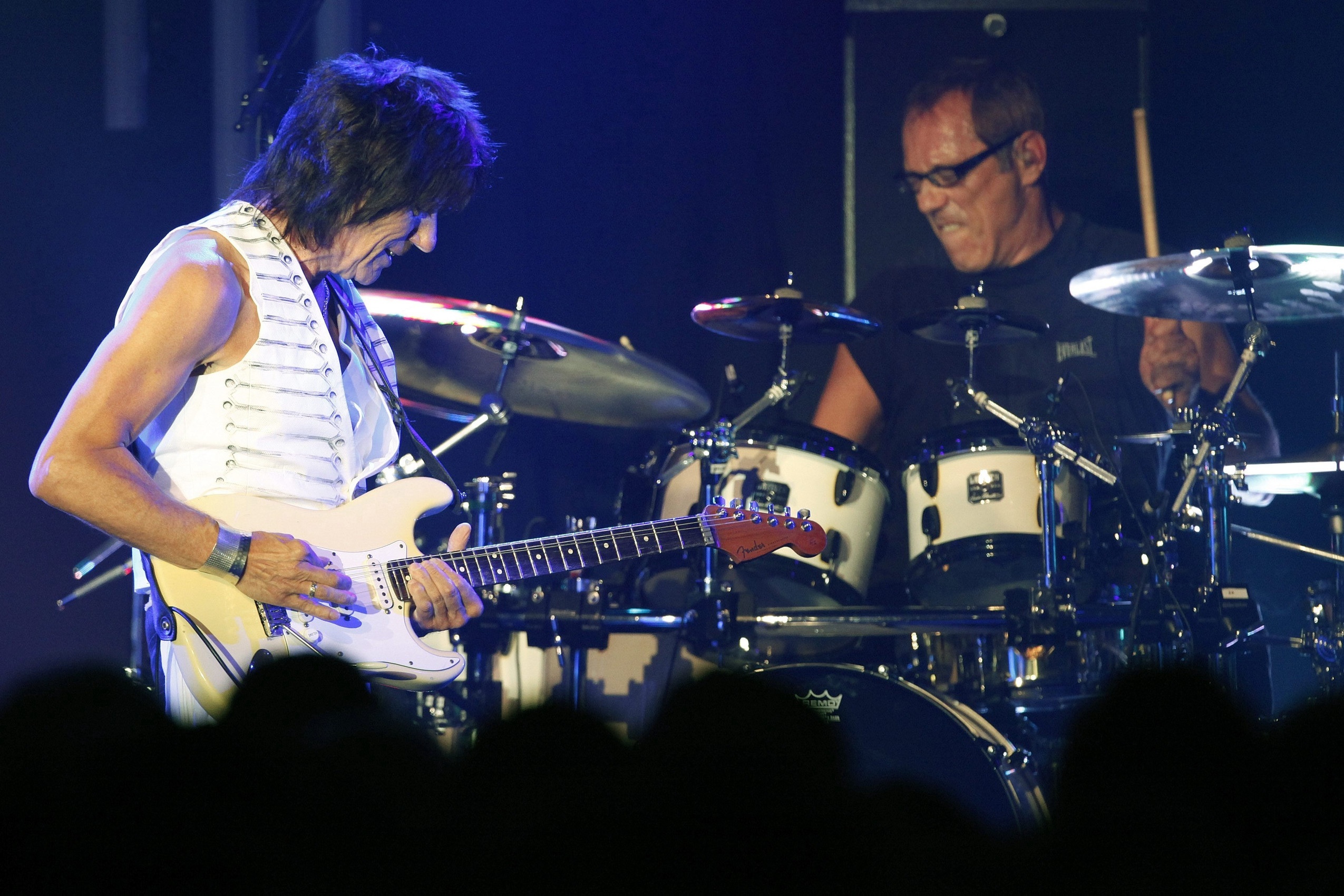
Vinnie Colaiuta
With such a busy schedule how do you stay sane and keep on top of it all?
“I think it’s dependent on your inner attitude towards things; a balance of being able to cope under pressure through gratitude or humour, for example, while at the same time understanding that you made the choice to be there in the first place. If you find yourself in a difficult situation, then the choice is yours in terms of how you respond; you either change it or, if it can’t be changed, you learn from it by coping with it better. Getting adequate rest is very important too, as is being able to relax properly and take your mind off things. I find reading very helpful. When you play an instrument you also realise that it is a process that happens over years. There is a slow development, with peaks and valleys along the way. It’s not just about having an instant peak and staying there.”
If you could go back and teach your younger drumming self one important lesson, what would it be?
“Be yourself and be happy being yourself because, at the end of the day, that’s all you’ve got. When you are young and impressionable of course you want to imitate your icons, and that is why role models are so important. It’s the natural thing to do, but you have to graduate from the imitation phase and the peer pressure around you. We emulate people for good reason - because it’s valuable; we want to learn from them and develop our drumming vocabulary. But, if you are comfortable with yourself, then you can draw on all those different sources as part of the learning and growing process, assimilate the information and keep your own identity throughout the transition. I’ve had enough experience with it to realise the value in doing that, and I’d like to impart that wisdom.”
“Be yourself and be happy being yourself because, at the end of the day, that’s all you’ve got. When you are young and impressionable of course you want to imitate your icons, and that is why role models are so important. It’s the natural thing to do, but you have to graduate from the imitation phase and the peer pressure around you. We emulate people for good reason - because it’s valuable; we want to learn from them and develop our drumming vocabulary. But, if you are comfortable with yourself, then you can draw on all those different sources as part of the learning and growing process, assimilate the information and keep your own identity throughout the transition. I’ve had enough experience with it to realise the value in doing that, and I’d like to impart that wisdom.”
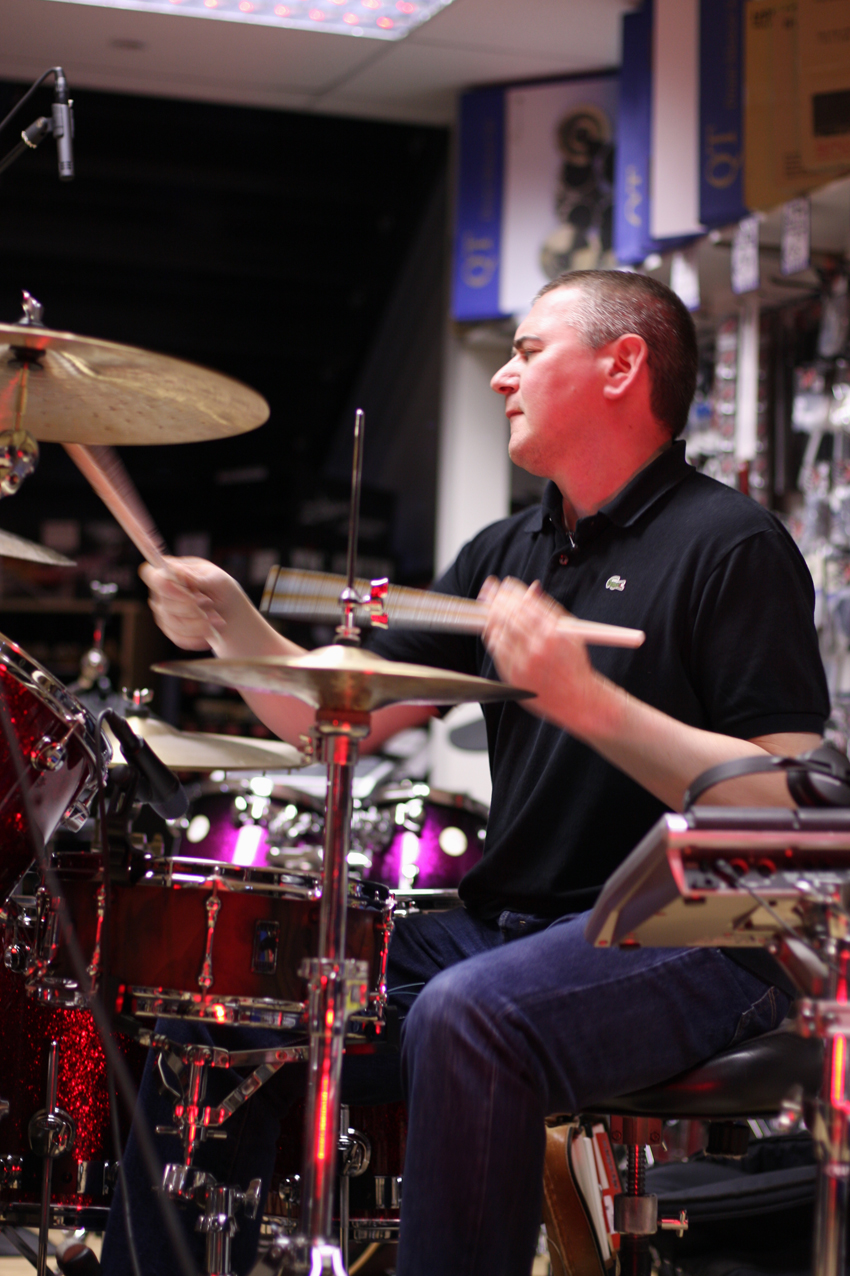
Steve White
You’ve immersed yourself heavily in education, too?
"One of my first drum clinics I was supposed to be supporting Steve Gadd, but I ended up playing with Peter Erskine. I must have been 18. It was at Blazers in Windsor. Seeing how Peter conducted a clinic was amazing. That's when I worked out not all drummers are good clinicians. I realised it was all about imparting education. I've kept that side of it at the forefront. It's not a gig, hopefully people are coming to learn something. I've got a book in the process that will hopefully be out in the next year or so. I get to teach at colleges and encourage some of the great new talent coming through now. Grant Kershaw is definitely a drummer to watch out for."
What drives you as a drummer?
"I like the phrase ‘if you love your job you'll never have to work’. It's such a privilege to do something you absolutely love and get paid for it. I'm very good at separating the two words ‘music’ and ‘business’. The music never gets jaded by the business. This isn't the greatest run business in the world. It is full of people who don't have a great acumen for running a business, that's why it's in such a state at the moment. Music is in a great place though. I absolutely still love music. Yesterday I was watching YouTube and Philly Joe Jones drum solos and getting an absolute buzz from that. That's something I never could have done 25 years ago.
"Finishing with Paul three years ago was a massive decision and was a massive wrench musically. Since then I've gone on to play with John Lord. I've started my own management company, bringing on new talent. That's what drives me. As a drummer I've really re-discovered the greats of the instrument who play great time, guys like Al Jackson Jr and Mel Lewis."
What lesson would you pass down to young Steve White?
"On a business level it would be to always ask to be cut in. You absolutely never know where a performance is going to end up. When I first started making records CDs were a new concept, let alone downloads, DVDs and the internet. All these things provide income streams. I was a little slow at getting into that. On a musical level I don't regret anything - a few dodgy haircuts and strange tops in the 80s maybe! I've had a great time and I'm still inspired for the next 25 years."
Who are some of your main influences?
"When you first get into drumming you do tend to gravitate towards the people that make that first impact. How many times have you heard people say I got into Ringo from the Ed Sullivan show, or John Bonham, or Dominic play with Muse? That first impact really lasts. For me it was people like Louie and Buddy. Those guys have stuck with me. I'm always listening out for new drummers that inspire me. I love Stanton Moore, I love Keith Carlock. Dom from Muse, Thomas Haake. The music’s not my thing but the drumming is awesome. You see what these guys are doing and it's never been a better time for drummers. My advice for younger drummers is don't get intimidated by it. It can become a bit overwhelming. What you've got to remember is that, talking about moments in time, the public are still talking about Moon and Bonham as the greatest exponents of what they do and the reason they do that is because they were great in bands."
What plans do you have for the near future?
"Apart from the birth of twin boys in September myself and Craig Blundell are writing a performance piece for the London Music Show which involves his influences and my influences, old school and new school. Craig has been a massive influence in the last year in terms of kicking me up the backside to learn new technologies and use the Roland SPD-S in my clinics. I'm really looking forward to that. I'm managing a couple of young artists, Sam Gray being the first. He'll be launching a single soon. I hope to see some success with him. I'm playing with Jon Lord and I also have a solo album with Damon Minchella that will hopefully be out before the end of the year. I couldn't be happier at the moment."
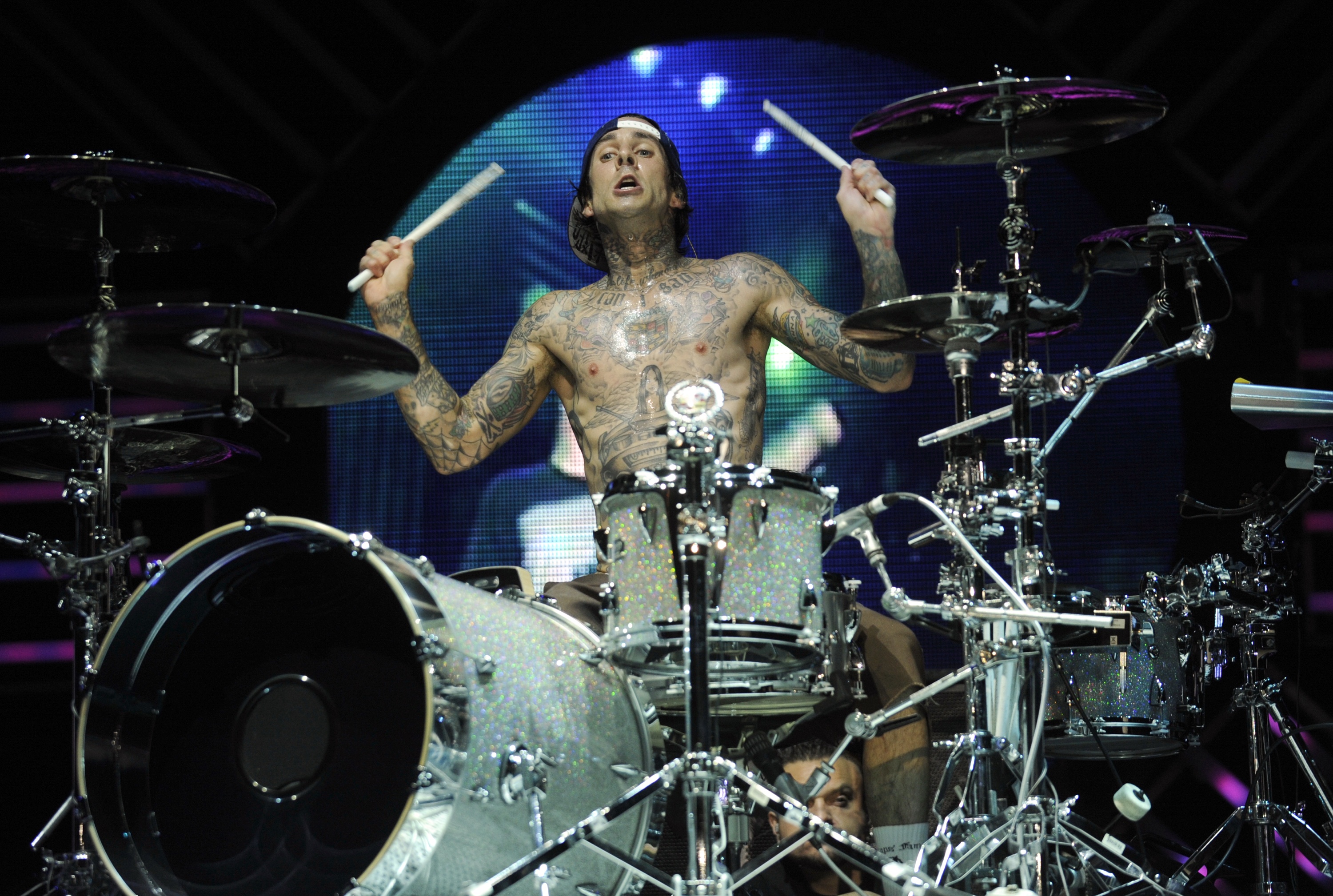
Travis Barker
If you could go back and teach your younger drumming self one thing, what would it be?
“Nothing. I like right where I’m at and how I turned out.”
How do you think the drum industry has changed over the last 25 years, and where do you think it's going?
“I think it’s cool that over the years I’ve seen magazines like Modern Drummer and more conservative magazines open up and cover more genres and styles of artists.”
Like acknowledging punk, for instance?
“Yeah, or death metal or people you wouldn’t normally see.When I grew up, all I saw was jazz dudes.No diss to jazz dudes or fusion dudes or funk dudes, they were all good.I grew up on Gadd and Dennis Chambers.It’s so cool when you’re young and you like all that stuff, respect to all our peers and legends, but it’s also cool to hear about your favourite drummer in that way out band that you like that they normally wouldn’t cover.I think it’s cool they do that.I’ve always thought the drum community was pretty cool.All the magazines would put chop busters in there and then transcriptions from someone’s song.I grew up on all that, so I love it.”
You are part of our 25 Drum Icons feature. What does it mean to you to be classified as a drumming icon, and who else would you choose to include?
“I love Gadd, Dave Lombardo, Mikkey Dee, Keith Moon, John Bonham, John Blackwell, Fish, Rob Carson... it’s hard, there are so many.To even be listed as an icon, it’s another one of those ‘moments’.”
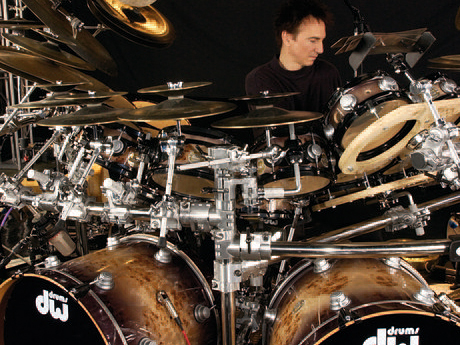
Terry Bozzio
If you could go back and teach your younger drumming self one important lesson, what would it be?
“I can't change the past, so I try to accept that everything I have done, good or bad, has helped to make me what I am today. And today is all I have to teach myself any important lesson that may occur to me.”
How do you see the next 25 years of your drumming career panning out?
“I really don't feel I have a ‘career’ as such! I try to take it one day at a time! Right now I am more excited about playing with BHLM than anything I have ever done... it's a dream band for me, and I absolutely love being able to work, teach, share, play with and interview other drummers at drumchannel.com.”
You have featured on a number of Rhythm covers. Which ones have been your favourites and what memories do you have of doing them?
“I don't really have a favourite, I’m just happy that I made it on!”
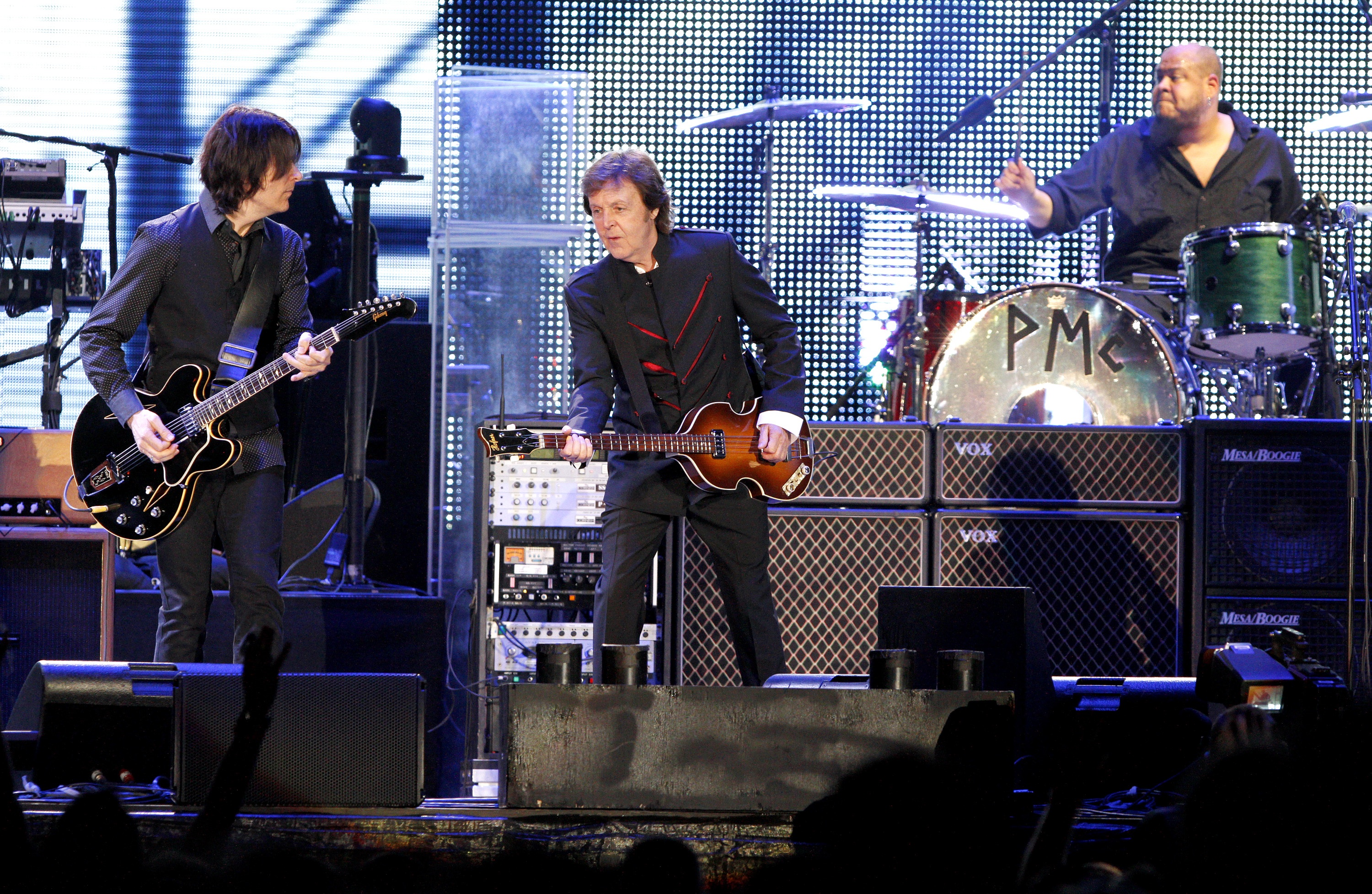
Abe Laboriel Jr
You are part of our 25 drum icons feature. What does it mean to you to be classed as a drumming icon, and who else would you choose to include?
"Being considered an icon is a concept I can't quite grasp. I feel like I associate and hang out with a lot of icons and I would simply describe myself as lucky. The drummers who inspire me and that are iconic for me are: John Bonham, Jeff Porcaro, Ringo Starr, Stewart Copeland, Terry Bozzio, Matt Cameron, Dave Grohl, Phil Selway, Joey Waronker and Thomas Pridgen. I also want to mention Mark Brzezicki. I was heavily into Big Country and he has such a great combination of finesse and groove and not enough people talk about him in the states!”
How do you see the next 25 years of your drumming career panning out?
“I hope to continue doing what I am doing now, which is being open to any and all moments of making music, whether I am physically playing the drums, any other instrument or simply steering the ship via production.”
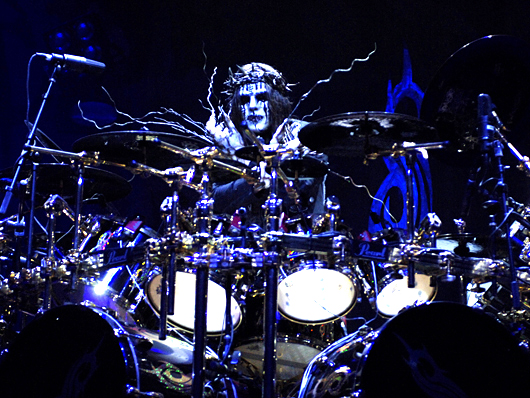
Joey Jordison
If you could go back to the start and teach your younger drumming self one thing, what would it be?
"I’d tell myself to learn to play left-handed as well as right-handed. Neil Peart always tries to do that, and it’s my goal right now to become as fluent left-handed as I am with my right. That’s what I’m trying to do right now, but once you’ve got your style, you’ll never learn to do it. I have so many different styles, because I played jazz for so many years and in a big band, and I studied with a lot of African-American drummers for the funk aspect, but I’d really like to train the right side of my brain to control the left side of my body."
You are part of our 25 drum icons feature. Who else would you choose to include?
"My favourite drummer of all time is Keith Moon, and of course I’d choose John Bonham, Gene Krupa, Buddy Rich, Dave Lombardo, Pete Sandoval from Morbid Angel, Frost from Satyricon… man, there’s so many. I’m a big fan of Tim Alexander from Primus, too. Dennis Chambers. Dave Weckl. Man, I could go on – there’s been so many over the years, it would take a whole day to list them!"
How do you see the next 25 years of your drumming career panning out?
"I’ll do this until my last breath. It’s what I’ve been put here for: it’s my passion and it’s pretty much my life. Slipknot could go another 20 years, or it could go another two: I don’t know. Our band is like a freight train that’s ready to fall off the tracks at a million miles per hour, but it never does."
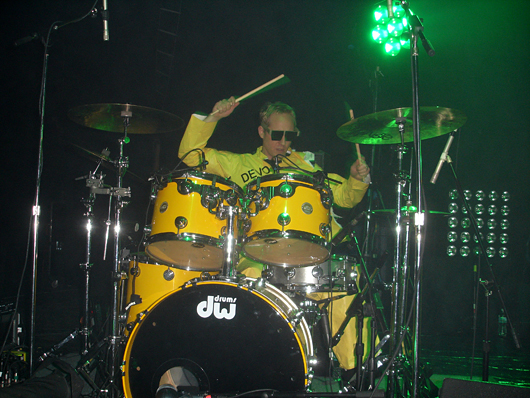
Josh Freese
With so much going on how do you stay sane and keep on top of it all?
“I basically have no social life. It’s my kids and playing drums. I thrive on it in a weird way. I played a gig with Weezer the other night on the East Coast and I got a chance to work with a producer on a new band’s record. They wanted to start Monday at noon so I changed my flight to 6AM in New York which means getting up at 4AM to get to the airport. The guys in Weezer were going, ‘What are you, nuts? Why are you doing that?’ I’m thinking, ‘Because this is what I do.’”
How do you think the drum industry has changed over the last 25 years, and where do you think it's going?
“That’s a good question! I don’t know. From a personal standpoint it’s been very cool to see DW grow into what they have grown into. I’ve endorsed them since I was twelve-years-old.”
You are part of our 25 drum icons feature. What does it mean to you to be classed as a drumming icon, and who else would you choose to include?
“Oh man! I’m not worthy! Give it to someone else! If I had to name three or four guys, I’d have to say Vinny Colaiuta, Terry Bozzio and Stewart Copeland with a little Alex Van Halen for good measure.”
How do you see the next 25 years of your drumming career panning out?
“There are a lot of people I’d like to work with. In 2003 I made a record with Josh Homme called The Desert Sessions Volumes 9 and 10. PJ Harvey was involved in it. All of us were star-struck. Every time she turned around we’d all go, ‘Look! It’s PJ Harvey! We’re in the studio with PJ Harvey!’ Three months after that, I got a call about going on the road with her. I was just gearing up for A Perfect Circle again and I was really sad to have to pass that up because I’d love to work with Polly.”
You have featured on many Rhythm covers. Which ones have been your favourite and what memories do you have from doing them?
“I remember one photo shoot when I was playing with Sting and then I did a shoot at Studio City Sound. I remember it was a cover that I didn’t hate, unlike some of the covers I’ve been on for other magazines where I can’t even look at it. The pictures were great and the article was great – I didn’t do anything to embarrass myself.”
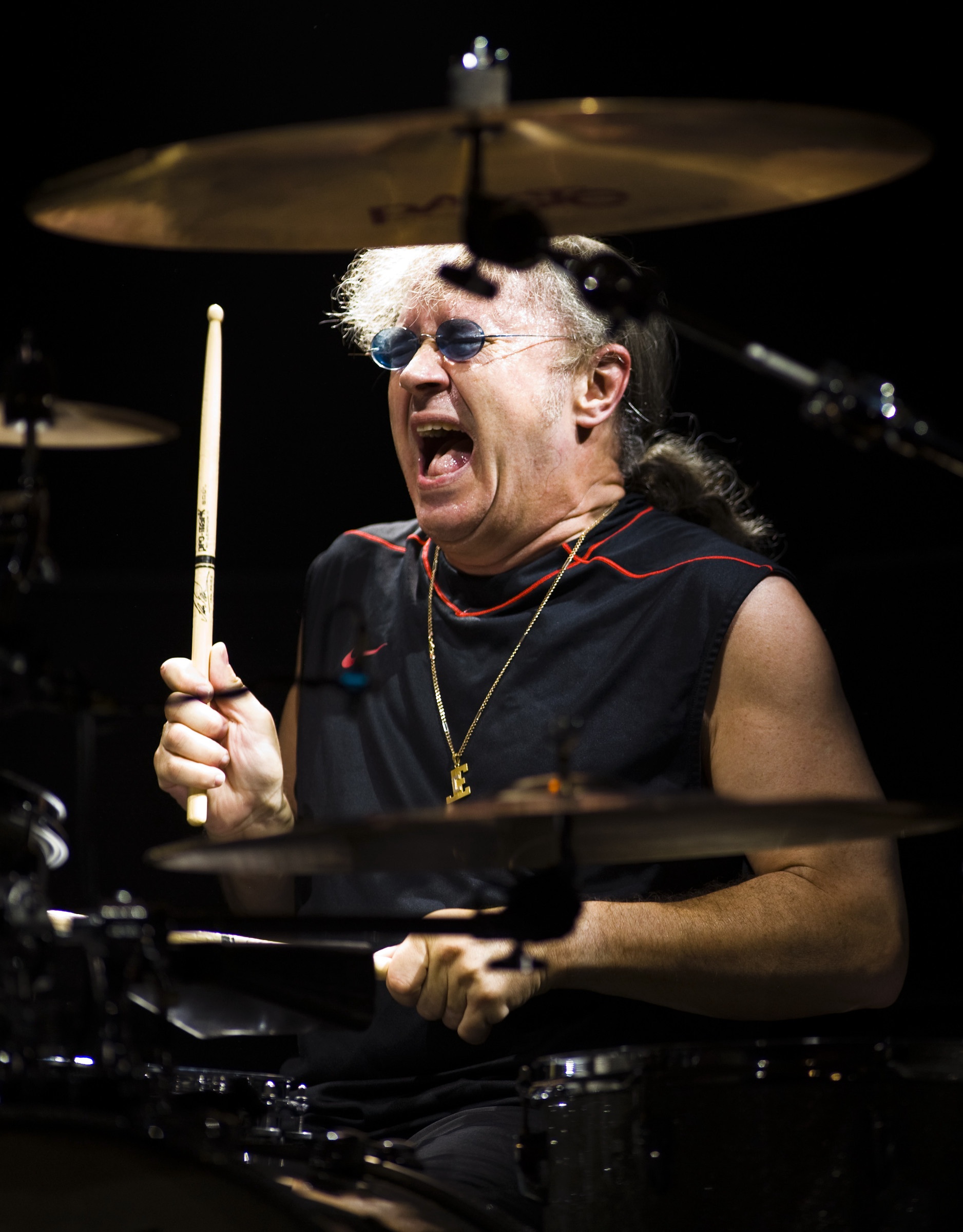
Ian Paice
With such a busy schedule how do you stay sane and keep on top of it all?
“I think it’s in your nature, in your individual character, how you manage to deal with the ‘Loony Tunes’ and ‘Disneyland’ world of being on the road, where everything is focussed and centred around you. If, when you come back into reality, you can deal with ‘normal’ - like going to the supermarket, putting the garbage out - it’s not a problem. You understand that it’s two sides of the coin that actually make the coin valuable. For some people, though, Disneyland is the only place they want to be. Like Keith Moon, whose whole life was built around what he had become - a 24 hour maniac rock ‘n’ roll star. You can’t ever imagine Keith having a normal day... Most drummers tend to be extremes though - there’s generally not a grey area – and to my detriment, or through the luck of the Gods, when I come off the road I find it very, very easy to switch it all off and just become Mr Average. I really believe that having the ability to do that gives you the chance to keep going for much longer.”
What drives you as a drummer?
“Well, I still enjoy playing the drums. Nothing that I play is orthodox; everything I have is self-taught with all the glories and downfalls that that brings. I don’t know why people like what I do - it’s not that clever, it’s not that technical - but, whatever it is, it communicates and I’m very, very frightened of mucking up something so precious. It’s not like coming to a full stop, but it means that I don’t go looking for other stuff which may dilute the very thing that makes my performance work, and when I do find something new it’s by accident. Maybe that’s a shame, but I am so protective of what I have, especially as I don’t know exactly what it is! I’ll listen back to things I’ve done and I’ll be mesmerised myself, because I don’t know what I did, or how I did it. All I do I know is that I’ll probably never do it again!””
I'm MusicRadar's eCommerce Editor. In addition to testing the latest music gear, with a particular focus on electronic drums, it's my job to manage the 300+ buyer's guides on MusicRadar and help musicians find the right gear for them at the best prices. I dabble with guitar, but my main instrument is the drums, which I have been playing for 24 years. I've been a part of the music gear industry for 20 years, including 7 years as Editor of the UK's best-selling drum magazine Rhythm, and 5 years as a freelance music writer, during which time I worked with the world's biggest instrument brands including Roland, Boss, Laney and Natal.
